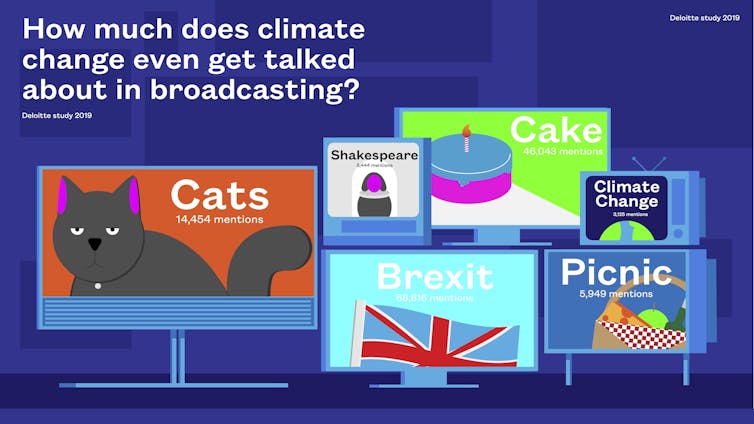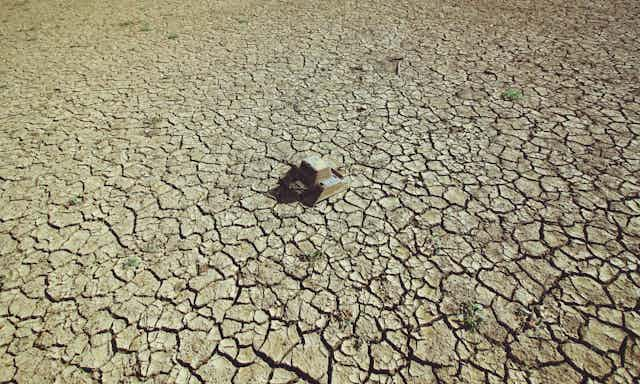The topic of climate change features on British television about as often as that of zombies, urine, or rhubarb. A recent study analysed a year’s worth of TV: over 100,000 non-news programmes, across 40 TV channels, including the BBC, ITV, Channel 4 and Sky. Unsurprisingly, Brexit topped the chart for number of mentions, closely followed by cake – and then cats. Climate change got only 3,125 mentions (compared to Brexit’s 68,816).
When it does feature, the focus on sustainability practices is disproportionate to their impact. While food (often veganism) features in 40% of the already minimal coverage, food production and the choices around what we eat only contribute to about 12% of the average UK citizen’s carbon footprint. Travel and energy use, on the other hand, amount to 15% of the coverage, but account for almost half of that footprint.
This is surprising, as TV has often been exceptionally forward thinking in tackling emotionally charged and socially important but neglected issues. This is especially true of the soaps, which have covered topics including mental health, human trafficking, rape, and transgender issues. But not climate change.
But the creative people involved in making television, and making the decisions about what television gets commissioned, are, like many of us, caught up in busy everyday lives. They know about the climate crisis, most likely accept that it is happening, but can, for the most part, ignore it. It does not feature heavily in everyday conversations at the school gates, in the pub, at dinner parties, the office.

Rather perversely, this socially generated silence persists precisely because the ecological crises of our time pose such a profound existential threat. The anxiety they provoke is so unsettling that we develop tacit, unspoken agreements to not talk about environmental problems in a meaningful way.
Individually and collectively, we develop defence mechanisms to stop us thinking and feeling too deeply about the problem – blaming others, projecting the problem into the distant future, telling ourselves we are doing our bit, or even escalating problematic behaviours or viewpoints to convince ourselves there isn’t a problem in the first place. And of course, such tactics will be true of those working in TV.
But despite the powerful forces of denial, a global consensus is growing. We can no longer turn our backs on the facts – we are living through an unprecedented climate crisis that threatens the existence of countless species, including our own. Television can and should have a vital role in reflecting all this. Would long-running television drama have ignored the suffragette movement, the abolition of slavery or the civil rights movement?
Breaking through
We can think of the recent report as a timely call to arms. Because television coverage matters. Broadcasters, writers, producers, and commissioners all have a responsibility to reflect what is going on in the world.
This is not just because of its powers of persuasion. Yes, there have been some high-profile successes in documentary making, including the “Attenborough effect”, which led to a reduction in single-use plastic. But that is not the whole point. Making the climate crisis, species loss and sustainability part of the TV landscape could help break through socially organised silence, enabling us to begin and maintain important conversations. Like the weather (ironically), what’s on the telly is one of the things we often do feel comfortable in talking about.
But broadcasters also have a duty to avoid erroneous and simplistic solutions. We don’t want TV to encourage us to assume, for example, that making better individual consumption choices will “fix” the climate crisis. It won’t. Repeating problematic storylines as part of a wider narrative of how to address climate change – tweaking individual consumption choices, recycling more, gradually making a difference – could seriously backfire, adding to a false sense of reassurance that inoculates us further against facing up to the realities of the climate crisis.
Instead, the conversation needs to be wide ranging and well informed. Television drama, comedy and entertainment output is capable of addressing climate change as a serious issue, and equally important is tackling difficult questions about what practices are most important, what changes are needed, how can we work together, pressurise for change, and perhaps most difficult of all, consider what might be lost.
Climate catastrophe
The big new BBC drama Years and Years, already critically acclaimed, is an interesting step in the right direction. The series takes the everyday lives of an extended family in 2019 and then rapidly moves forward in time, presenting a plausible future marked by profound changes, which, if mentions of lost species in the first episode are anything to go by, will incorporate climate and environmental breakdown as the series progresses.
This is good, but I’m talking about getting to the heart of mainstream, not a one-off drama. We don’t have to depict Salford Quays breaking its banks and flooding Coronation Street, or Extinction Rebellion taking over Albert Square, but there are lots of opportunities for creative and imaginative storylines in comedy, drama and entertainment.
We’ve seen vegan week on the Great British Bake Off, but what if Emmerdale dramatically tackled debates about rewilding, meat production or soil degradation? Or if Holby City grappled directly with physical and mental health issues relating to air pollution or ecological grief? School climate strikes discussed in the Rovers Return? I could go on.
The present moment holds vast opportunities. Many commentators have suggested there has been a shift in the last few months, with climate change at last beginning to be taken seriously as a national and global emergency. At the same time, its effects are increasingly being witnessed by many people across all parts of the globe.
Television can, and should, help gather greater momentum, encourage us out of our understandable defensiveness, and advance the national and international conversation about how to address the climate crisis collectively.


